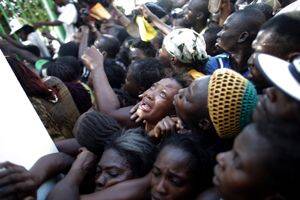As most of the international rescue teams shut down and prepared to fly home more than two weeks after the Jan. 12 Haitian earthquake, relief agencies from across the Catholic world are beginning to settle in for the long haul, responding to the immediate needs of the thousands of injured and dislocated among Haiti’s already impoverished populace and strategizing for the Caribbean nation’s long-term recovery. But even the massive amount of aid pouring into the country is dwarfed by the overwhelming needs of people who lost their homes, families, jobs and possessions in the catastrophe, said Hector Hanashiro, Caritas emergency coordinator for Latin America and the Caribbean. "There is still a great lack of assistance," Hanashiro said. "There are not enough donations for the 3 million people who have been affected and more than 200,000 injured survivors of the earthquake.”
About 2 million people were affected in Port-au-Prince, and 1 million more in other cities, including Jacmel, Gressier, Carrefour and Petit-Goave, Hanashiro said. Some 500,000 people who lost their homes are living in makeshift camps around the Haitian capital. "There are specific high-risk groups that need assistance, including pregnant women, people with chronic illnesses, children who have been orphaned and people who were injured and who, because of trauma and complications, have had to have limbs amputated," Hanashiro said.
The Vatican has given the U.S.-based Catholic Relief Services the primary responsibility for coordinating the Catholic institutional response to the Haitian crisis. CRS country representative Karel Zelenka said aid distribution is proceeding under military escort as quickly as possible around Port-au-Prince, given that many roads remain blocked by debris and thousands of people are pressing aid agencies for assistance. "It has become impossible to do any distribution without a military escort," Zelenka said. "That puts stress on other parts of life here." Driving the security concerns, according to Zelenka, is the escape of up to 5,000 inmates from the city's prison. Haitian President Rene Preval said many of the escaped prisoners have resorted to looting and armed robbery in several Port-au-Prince neighborhoods. There have also been reports of human traffickers circulating among the camps, promising orphaned and desperate children food and likely condemning unattended children to sexual abuse and domestic slavery in Haiti and beyond.
Zelenka, who arrived in Haiti in October from Zimbabwe, said CRS staff members are working to distribute goods from two warehouses in the capital as well as from a large ship that was able to dock at the city's devastated port. "On such a short notice it's just impossible to get these kinds of quantities [of supplies] all over the country," he said. "There's hardly any infrastructure at all. Now, can you imagine, you're supposed to move these huge quantities of supplies on roads that were nonexistent before the earthquake? It's just really inhuman."
While Zelenka confronted this immediate logistical nightmare in delivering aid, others were focusing their attention on devising “a long-term coherent strategy for recovery, development and poverty reduction” for Haiti. That’s what Bishop Howard J. Hubbard of Albany, New York, the chair of the U.S. Bishops’ Committee on International Justice and Peace, urged in a January 26 letter to Secretary of State Hillary Clinton, Treasury Secretary Timothy Geithner, Homeland Security Secretary Janet Napolitano and U.S. Trade Representative Ambassador Ron Kirk.
Bishop Hubbard said such a strategy for rebuilding Haiti requires coordinating “different U.S. government agencies in a comprehensive approach, engaging other groups with expertise and experience with Haiti.” Bishop Hubbard recommended that the strategy include: debt relief, trade preferences, extension of Temporary Protected Status for Haitians living in the United States as needed, and sustained reconstruction and development assistance to Haiti.
Bishop Hubbard expressed gratitude for President Obama’s response to the earthquake in Haiti and added, “When the international community and Haitians move beyond the most urgent aspects of the emergency, we urge a substantial and sustained commitment by the U.S. Government to provide long-term funding for reconstruction and poverty reduction.”
As the Rescuers Depart, the Hard Work Continues in Haiti
Show Comments (
)
Comments are automatically closed two weeks after an article's initial publication. See our comments policy for more.
The latest from america
President Donald Trump ordered U.S. flags to be flown at half mast in honor of Pope Francis. Mr. Trump, one of many U.S. political leaders remembering the late pope, called Francis “a good man.”
In his brief final testament, Pope Francis asked to be buried at Rome’s Basilica of St. Mary Major and said he had offered his suffering for peace in the world.
Pope Francis died April 21 after suffering a stroke and heart attack, said the director of Vatican City State’s department of health services. The pope had also gone into a coma.
Loving God, today, we grieve for our beloved Pope Francis.








